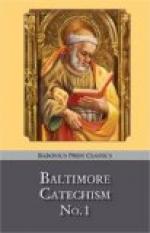344. Q. Why do we pray before the crucifix and the images and relics of the saints? A. We pray before the crucifix and images and relics of the saints because they enliven our devotion by exciting pious affections and desires, and by reminding us of Christ and of the saints, that we may imitate their virtues.
LESSON TWENTY-EIGHTH FROM THE SECOND TO THE FOURTH COMMANDMENT
345. Q. What is the second Commandment? A. The second Commandment is: Thou shalt not take the name of the Lord thy God in vain.
346. Q. What are we commanded by the second Commandment? A. We are commanded by the second Commandment to speak with reverence of God and of the saints, and of all holy things, and to keep our lawful oaths and vows.
347. Q. What is an oath? A. An oath is the calling upon God to witness the truth of what we say.
350. Q. What is a vow? A. A vow is a deliberate promise made to God to do something that is pleasing to Him.
351. Q. Is it a sin not to fulfill our vows? A. Not to fulfill our vows is a sin, mortal or venial, according to the nature of the vow and the intention we had in making it.
352. Q. What is forbidden by the second Commandment? A. The second Commandment forbids all false, rash, unjust, and unnecessary oaths, blasphemy, cursing, and profane words.
353. Q. What is the third Commandment? A. The third Commandment is: Remember thou keep holy the Sabbath day.
355. Q. How are we to worship God on Sundays and holydays of obligation? A. We are to worship God on Sundays and holydays of obligation by hearing Mass, by prayer, and by other good works.
358. Q. What is forbidden by the third Commandment? A. The third Commandment forbids all unnecessary servile work and whatever else may hinder the due observance of the Lord’s day.
359. Q. What are servile works? A. Servile works are those which require labor rather of body than of mind.
360. Q. Are servile works on Sunday ever lawful? A. Servile works are lawful on Sunday when the honor of God, the good of our neighbor, or necessity requires them.
LESSON TWENTY-NINTH FROM THE FOURTH TO THE SEVENTH COMMANDMENT
361. Q. What is the fourth Commandment? A. The fourth Commandment is: Honor thy father and thy mother.
362. Q. What are we commanded by the fourth Commandment? A. We are commanded by the fourth Commandment to honor, love, and obey our parents in all that is not sin.
363. Q. Are we bound to honor and obey others than our parents? A. We are also bound to honor and obey our bishops, pastors, magistrates, teachers, and other lawful superiors.
365. Q. What is forbidden by the fourth Commandment? A. The fourth Commandment forbids all disobedience, contempt, and stubbornness towards our parents or lawful superiors.




